#pmdawarenessmonth2022
Explore tagged Tumblr posts
Text
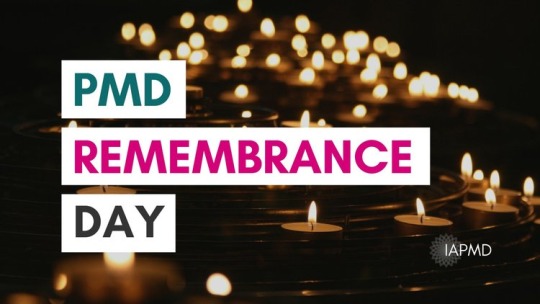
On April 27 we reflect and honor those who have lost their lives to PMDD or PME.
#pmdawarenessmonth2022#pmdrememberenceday#pmdd#premenstrual dysphoric disorder#pme#premenstrual exacerbation#living with pmdd#chronic illness#invisible disability#mental health#mental health awareness#actually pmdd
14 notes
·
View notes
Photo
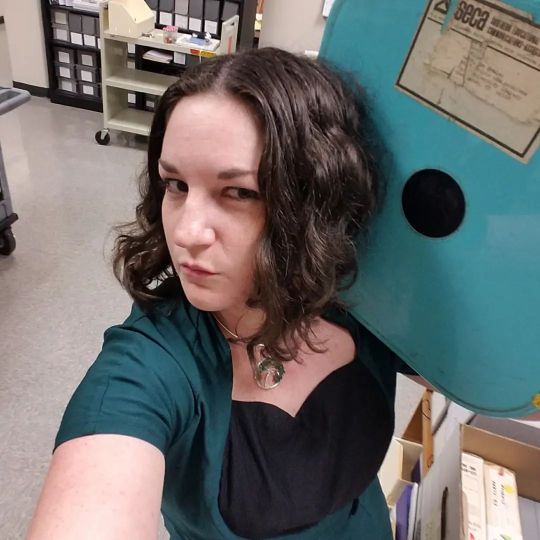
#pmdawarenesschallenge Day 26: Strong. "Don't pick that up, it's too heavy!" my mom or grandma used to say to me, when I would try to pick up boxes or heavily loaded grocery bags. They did this to me not in my childhood, but when I was in my 20s, as if I didn't carry around 20-30lbs of film or videotape on a regular basis. That's the fun part of being an archivist: your wardrobe needs to look professional, even as you do a job with minimum lift requirements in the job description. I always found packing and moving 2in videotapes around most satisfying when I was femmed up in a pencil skirt and heels. These days, my archivist skills are limited to the digital realm. I do enjoy weightlifting though, even if it's just relatively light weight barbells. I seldom look like my femme archivist ideal self as I do it. I catch my reflection in the mirror and am reminded of Vasquez in Aliens (Dir. James Cameron, 1986). Though my mental inspiration as I do reps is a different James Cameron badass: Sarah Connor from "Terminator 2: Judgement Day" (1992). I used to dislike Connor as a character for years, thinking "T2" was a film obsessed with putting her best down relative to the T-800 (Arnold Schwarzenegger). With adulthood came the realization that Connor's moments of weakness were usually rooted in PTSD from the events of the prior film. With that realization came new respect for this messed up, but resilient woman who could single arm pump a shotgun. Strength comes in many forms, and can coexist with weakness. My stubbornness is both strength and weakness. My highly oversensitive body is capable of feats of strength. My sense of self is always my strongest attribute though, whether I look like a femme fatale, butch space marine, or whatever suits my idiom on that particular day. #pmdawarenessmonth2022 https://www.instagram.com/p/Cc1vrWOrWBE/?igshid=NGJjMDIxMWI=
2 notes
·
View notes
Text

Art by @alyseruriani for PMD awareness month 2022
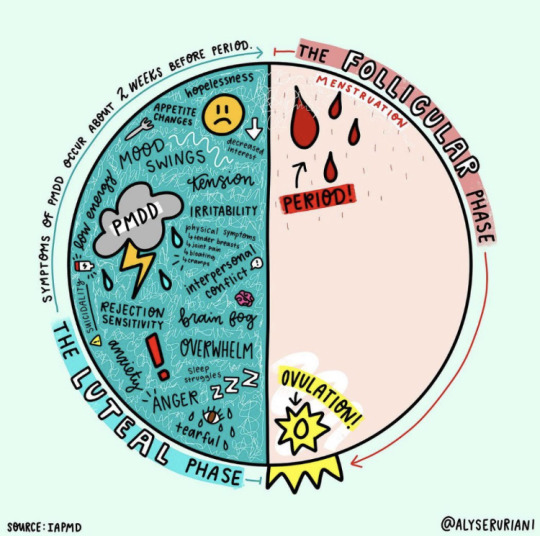
#pmdawarenessmonth2022#art#illustration#pmdd#pme#pmd#premenstrual exarcerbation#premenstrual disorder#premenstrual dysphoric disorder#living with pmdd#mental health#actually pmdd#mental health awareness#pmdd awareness#pmddsupport#afab problems#afab health#women’s health#pms
437 notes
·
View notes
Text

#pmdawarenessmonth2022#pmdd#meme#mental health meme#premenstrual dysphoric disorder#pme#premenstrual exacerbation#living with pmdd#mental health#actually pmdd#mental health awareness#memes#my meme#my memes#afab problems#afab things#afab health
193 notes
·
View notes
Text

#pmdawarenessmonth2022#pme#pmdd#meme#premenstrual dysphoric disorder#premenstrual exacerbation#mental health awareness#memes#my meme#my memes
74 notes
·
View notes
Text
^^Tips for dealing with brain fog^^
Today’s Tips: Brain Fog
Brain fog is that experience a lot of us spoonies have where your thinking feels, well, foggy! More specifically, it can include any or all of the following:
Trouble focusing
Memory problems- like general forgetfulness, not being able to recall information for school, or walking into the kitchen and not remembering why you’re there. Basically anything memory related
This is also technically part of memory, but difficulties often show up with word finding in particular. That’s when you know what you’re thinking of, but you can’t quite recall the word for it.
Thinking more slowly than usual and needing more time to process things
Being more distractible
Not being able to multitask
Not being as tuned in to your environment, and missing things that are going on around you (like someone walking in, or a sign on the door)
Getting confused more easily and/or more often
Trouble learning new things
Feeling overall spaced out or numb
Feeling like you can’t think clearly or your mind isn’t sharp
Mentally challenging tasks taking more energy than usual
Having a hard time with organization and time management
And probably even more cognitive things that I didn’t think of!
Brain fog is often caused by pain, fatigue, stress, or something inherent about your condition. It’s pretty common with chronic illness, but if you notice rapid changes for no apparent reason, don’t be afraid to get it checked out. A lot of the things that can cause brain fog are easy to catch on a blood test, and can then be treated. But for when brain fog is just part of the fun (sarcasm) that comes with your chronic illness, here are some ways to help cope:
-Try not to let the people who don’t understand get to you too much. Your struggles are valid!
-If people are being understanding, it can help to be honest with them about where you’re at that day. For example, if you can show up to class and just absorb some information, but don’t have the mental energy to answer questions, that’s okay! If your teachers are decent, you should be able to let them know this, so you can avoid getting put on the spot, and participate in whatever way works best for you.
-Find a system that works for you to keep track of everything (appointments, due dates, reminders, chores, etc) and stick with it! When you can’t consistently rely on your brain to remember things, it’s really important to have external reminders to keep you on track. I have a big giant paper calendar, but you can also use your phone, sticky notes, setting alarms, having buddy to help, or anything else that works for you. I’m sure there’s some cool apps out there for this as well. The reason I say stick with it is because if you can get your system established as a habit, that’s one less thing you have to consciously remember.
-Going along with my last point, it really helps to figure out what gets your attention. That’s one of the things that can really make or break your reminder system. For example, if you’re going to quickly get used to a sticky note and stop noticing it, maybe notifications on your phone will work better. In high school, I had a whiteboard calendar on the back of the basement door. That way, I could not leave for school without seeing it and remembering to check if I had what I needed for the day. If there was something really important, I would tape a strip of paper around my wrist, because that would really bug me, and keep reminding me to do the thing. These are just ideas, the key to this is whatever YOU are going to consistently notice.
-Tagging along with a friend’s routine and/or asking them to check in with you can help keep you on track. When you can’t seem to get started or figure out what to do next, having someone you can follow can be really helpful. I think this is related to the idea of “body doubling”, but I’m not an expert on that. That’s another strategy you could try though!
-If there’s something important you need to remember to bring with you, put it in the way so you can’t move on without it. Like, in the middle of the doorway. For some people, this also works for things you need to remember to do. Like if you’re lying in bed at night and think “Oh, I need to remember to water my plants tomorrow!”, toss something in the middle of the floor. So then when you wake up and go, “why is my water bottle over there??” it might jog your memory.
-Prioritize! Sometimes you don’t have the capacity to do it all, and that’s okay. If you just have to pick one thing to get done today, then that’s what you do. Putting your to-do list in order of priority can also help with deciding where to start and what to do next, because goodness knows decision making with brain fog is hard.
-Have a good-to option for when you just can’t make a decision. This one was my wonderful therapist’s idea! I have a really hard time deciding what to have for lunch, and that can wind up delaying lunch by an hour and creating a really frustrated Tea. So my therapist said, when that happens, just go to cereal, because we know that will be available and good enough. At least for me, it’s like having a magic escape from getting stuck trying to decide. I feel like this could also work for deciding what to wear? And probably lots of other things I didn’t even think of!
-When you can, plan challenging events for the time of day when you feel the best. If you can predict when you’re going to be extra tired and foggy, you can try to schedule around that too.
-Seek out formal accommodations at school or work. This can provide you with supports like having a note taker in class, extensions on assignments, having classes and meeting recorded so you can review later, extra time on exams, and access to tutoring. This process can be tricky, but if these things sound helpful to you, it may be worth a try. I have a couple posts about accommodations if you go look at the “Links To All Posts” tab.
-Study when you can, even if it’s for 5 minutes, even if it’s at a really weird time. And absorb what you can from class, even if it’s only a little, that’s okay. It’s absolutely okay (good, actually!) to take time off and just rest when you need it. What I’m saying is, if you feel okay overall but think it’s not worth going to class because your brain isn’t feeling 100%, it still might be worth it. You can still pick up a few new pieces of information while you’re half-listening, and start getting familiar with what you need to learn. This all adds up to less studying you need to do later, and makes it easier to learn new material. This strategy really saved me when I was a full time student AND taking lots of Benadryl. I would try not to stress about taking notes or understanding, and just absorb what I could. If this doesn’t work for you, that’s totally okay (actually, that goes for everything I say in this post!)
-If you take prescription medications, put them on auto-refill, so you don’t have to worry about running out.
-You can also usually sign up for reminder emails/texts/phone calls from your pharmacy, and doctor’s offices, and therapists.
-It’s okay to get creative when you can’t find a word! You can describe it, talk around it, or leave a blank if you’re writing (and then highlight it so you remember to come back later!)
-My overall theory is, if I know I’m forgetting something but can’t remember what, there will be another reminder later if it’s something really important. It’s not the end of the world if you’re a little late or disorganized, and having a chronic illness is hard enough, so go easy on yourself, okay?
As always, feel free to add your own tips onto these posts!
135 notes
·
View notes
Text

Hey all!
Below is a link for a petition to the U.S. Department of Health and Human Services requesting they fund research into a cure for PMDD. ✍🏼 Only takes a second and you can find more information in the petition itself.
https://chng.it/ThPDwXJpM6
Thank you @purplekittenwar for making me aware of this!
#pmdawarenessmonth2022#pmdd#pme#womens health#afab health#premenstrual dysphoric disorder#premenstrual exarcerbation#living with pmdd#mental health#actually pmdd#mental health awareness#pmdd awareness#pmddsupport#petition
67 notes
·
View notes
Text

#pmdawarenessmonth2022#meme#pmdd#pme#premenstrual dysphoric disorder#premenstrual exacerbation#living with pmdd#actually pmdd#mental health#mental health awareness#will smith#Chris rock#memes#my meme#my memes#pmdd awareness#pmddsupport#afab health#afab things#afab problems
54 notes
·
View notes
Text

#pmdawarenessmonth2022#mental health meme#meme#pmdd#premenstrual dysphoric disorder#pme#premenstrual exacerbation#mental health awareness#my meme#my memes#memes#living with pmdd#actually pmdd#mental health#afab health#afab things#afab problems
67 notes
·
View notes
Text

#pmdawarenessmonth2022#meme#pmdd#premenstrual dysphoric disorder#pme#premenstrual exacerbation#living with pmdd#actually pmdd#mental health#mental health awareness#memes#my meme#my memes#mental health meme#afab health#afab problems#afab things
37 notes
·
View notes
Text

#pmdawarenessmonth2022#meme#pmdd#premenstrual dysphoric disorder#pme#premenstrual exacerbation#memes#my meme#my memes#living with pmdd#actually pmdd#mental health#mental health awareness#afab health#afab things#afab problems
32 notes
·
View notes
Text

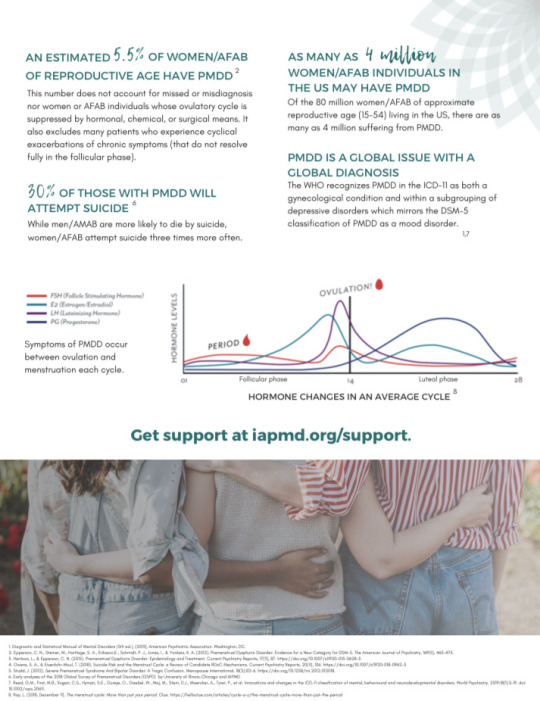
#pmdawarenessmonth2022#pmdd#premenstrual dysphoric disorder#pme#premenstrual exacerbation#living with pmdd#actually pmdd#mental health awareness#mental health#afab health#afab things#afab problems#resources
18 notes
·
View notes
Text


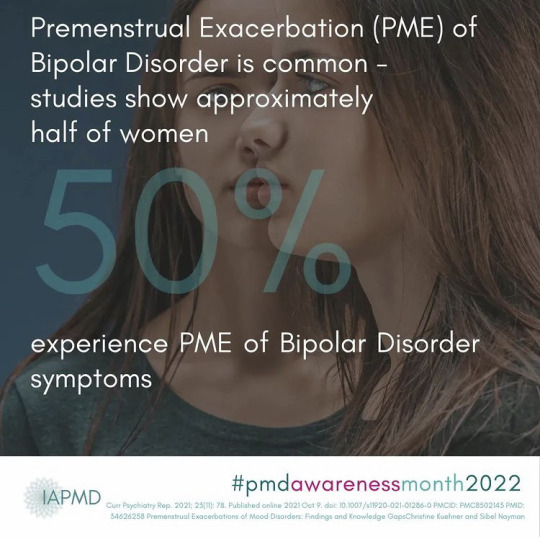
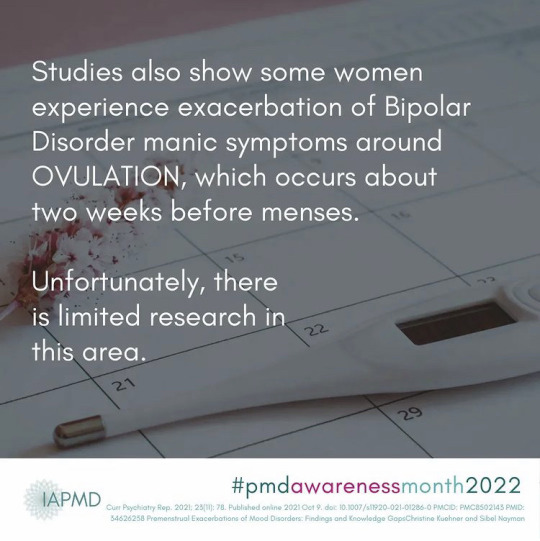
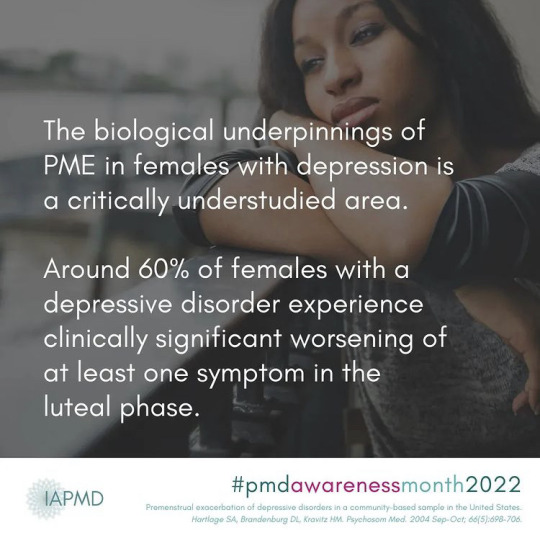
#pmdawarenessmonth2022#premenstrual exacerbation#pme#premenstrual disorder#premenstrual dysphoric disorder#pmdd#pmd#afab things#afab health#womens health#chronic illness
8 notes
·
View notes
Text

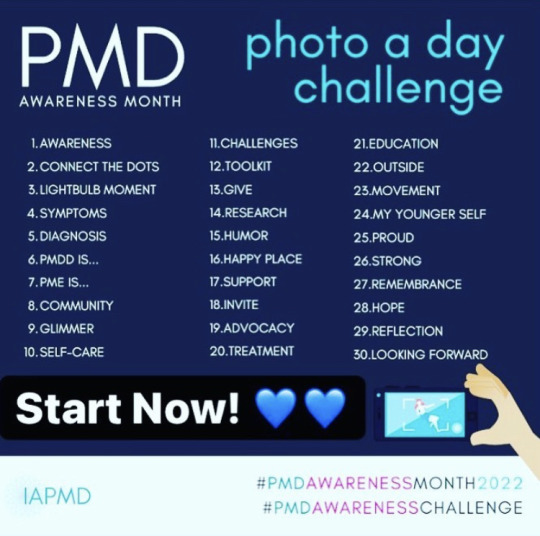
You may have noticed my blog name has changed to Living-With-PMD instead of Living-With-PMDD (new matching header coming soon).
This is following the International Association of Premenstrual Disorders broadening its annual awareness month from just PMDD to also include PME.
Both disorders are linked to the menstrual cycle and can be incredibly debilitating.
This month we are raising awareness and support for sufferers of premenstrual disorders, both PMDD and PME.
💙
#pmdawarenessmonth2022#pmd#pmdd#pme#premenstrual disorder#premenstrual exacerbation#premenstrual dysphoric disorder#actually pmdd#mental health#mental health awareness#afab things#afab health#living with pmd
5 notes
·
View notes
Photo

#pmdawarenesschallenge Day 21: Education. Poster by @iapmdglobal. #pmdawarenessmonth2022 https://www.instagram.com/p/CcoI_vfvwci/?igshid=NGJjMDIxMWI=
2 notes
·
View notes
Photo

#pmdawarenesschallenge Day 19: Awareness. Last year I was ambivalent to participate in #pmddawarenessmonth. Did I want to openly, publicly identity myself as having premenstrual dysphoric disorder (PMDD)? I decided that my perspective on the condition was worth sharing. In the process of disclosing my status, I discovered that I was not alone. And not feeling alone whilst having a premenstrual disorder is a big deal. Premenstrual disorders are isolating: the battle is within, and you're at risk of hurting others and your relationships with them. Talking about premenstrual disorders forces you between a rock and a hard place, in which the rock is toxic masculinity, and the hard place is feminism. Toxic masculinity doesn't want to acknowledge that women are autonomous, complicated beings who exist for reasons that have nothing to do with catering to The Patriarchy. Menstruation is inconvenient to The Patriarchy's sexualization fantasy of the female body existing solely for its pleasure. Feminism has tried to counter the patriarchal narrative by being menstruation positive, and making natural female biological processes as a source of power and pride. Part of taking pride in menstruation is debunking myths and stereotypes about premenstrual syndrome perpetuated by The Patriarchy to demean women, and render them incompetent. When you openly talk about how your period derails your life, makes you miserable, and effects you like lycanthropy, both The Patriarchy and Feminism disapproves if you. "Don't talk about periods! That's gross!" "Don't act like a homicidal bitch around your period, you're making Women look bad by proving negative stereotypes right!" Both groups need to get over their menstrual perceptions. Toxic men need to detox their binary, male centric views of humanity. Feminists need to be truly inclusive and compassionate to all menstruating individuals. In other words, they need to embrace that reality is diverse and weird and that "there are more things in heaven and earth than are defined in [their] philosophy." [Note: it's Day 1 of my cycle, and I feel awful. Coloring my drawing sounds too laborious.] #pmdawarenessmonth2022 (at San Francisco, California) https://www.instagram.com/p/CcjrudILQ47/?igshid=NGJjMDIxMWI=
2 notes
·
View notes